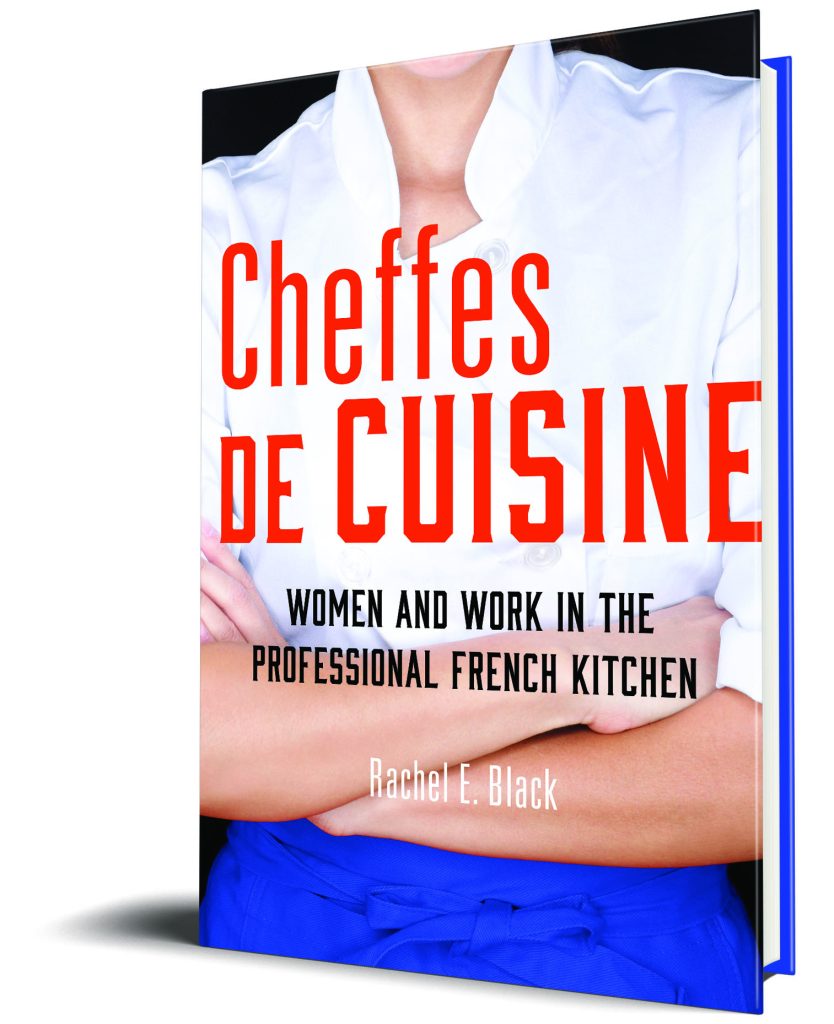
Rachel E. Black, author of Cheffes de Cuisine: Women and Work in the Professional French Kitchen, answers questions on her culinary influences, discoveries, and reader takeaways from her book.
Q: Why did you decide to write this book?
When I lived in Lyon, France in the 1990s, I heard stories about women who cooked in restaurants there in the 1930s. There was one woman, Eugénie Brazier, who had two three-starred restaurants. This seemed incredible to me since nowadays there are so few women who head restaurants that have any Michelin stars. In fact, there is only one woman, Anne-Sophie Pic, who heads up a restaurant with three stars, the top tier. When I went to see what had been written about these women who are known as les mères lyonnaises, I found very little. Although the mères are local legends, I could not help feeling there was a bigger story to tell here. At the start, I was focused on researching the history of women in professional kitchens in Lyon but as I got into it, I realized that this history was central to women’s experiences in the culinary arts today. For this reason, I moved to a more ethnographic approach to understand why women are underrepresented in professional kitchens, even in a place with such a rich history of women working as professional cooks and chefs.
Q: Who were your biggest influences?
My biggest inspiration was Eugénie Brazier. As I learned more about her life and legacy, I came to see how she inspired generations of female culinary professionals. The work of Jacotte Brazier, Eugénie’s granddaughter, supporting young women in the culinary arts has also been a big inspiration. Jacotte has been an amazing resource and a constant supporter of my work.
From an academic perspective, my mentor Carole Counihan’s work in feminist food studies has been a big influence. I have tried to follow Carole’s example of centering women’s lives and voices in food work. In this same vein, Meredith Abarca’s focus on women’s food work has also informed my approach to hearing and understanding narratives about women, work and food. David Sutton’s careful observations of ways of doing in the kitchen also influenced my analysis of the embodied knowledge that I was gaining in culinary school and as I worked in kitchens.
Q: What is the most interesting discovery you made while researching and writing your book?
Where to start? During my research, I discovered so much about cooking, history, and being a woman. In the kitchen, I discovered that a little water can help bring back together a broken emulsion and other cooking tricks that seem like magic but really are about physics. In the archives and through interviews, I learned that there is rarely one history and that the messier the past the more important and interesting the topic. The mères lyonnaises left few written documents behind and even if they had, I am sure their stories would still be complicated. These women meant many things to different people. During this research, I was graced with the gift of motherhood. This has brought me joy but it also made me realize what a struggle being a working mother can be. This experience added a new depth and angle to my research that I could never have imagined at the start of this project.
Q: What myths do you hope your book will dispel or what do you hope your book will help readers unlearn?
I hope that this book will help more people to see women as important cultural and professional actors in the culinary arts. Chefs are so often portrayed as male. I hope that this book will be part of shifting the popular media image to become more inclusive of women and people of all races and genders.
Q: What is the most important idea you hope readers will take away from your book?
Women have always been in professional kitchens and they have important contributions to make to this cultural form. There are broader social and economic barriers that need to be addressed in France and elsewhere so that women can fully participate in and benefit equally from their work. This is true for most kinds of work, not just cooking.
Q: What do you like to read/watch/or listen to for fun?
I feel like I should say cooking shows but that is not my first choice. As a working mother, I don’t have much time to watch TV but, once in a while, I enjoy French mystery shows like Lupin, which has great action and suspense. I also like how this show explores issues of race and class privilege in France, which is not something many French shows have done.
